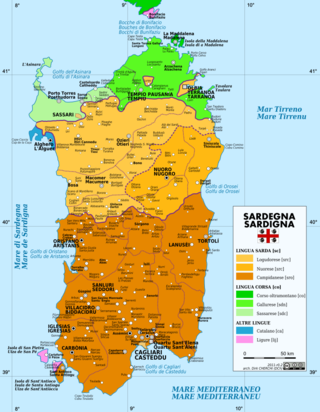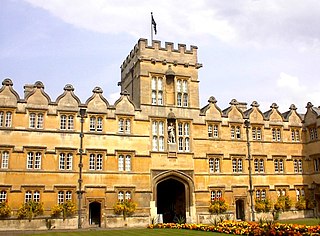Related Research Articles

Anointing of the sick, known also by other names such as unction, is a form of religious anointing or "unction" for the benefit of a sick person. It is practiced by many Christian churches and denominations.

Logudorese Sardinian is one of the two written standards of the Sardinian language, which is often considered one of the most, if not the most conservative of all Romance languages. The orthography is based on the spoken dialects of central northern Sardinia, identified by certain attributes which are not found, or found to a lesser degree, among the Sardinian dialects centered on the other written form, Campidanese. Its ISO 639-3 code is src.

University College, formally The Master and Fellows of the College of the Great Hall of the University commonly called University College in the University of Oxford and colloquially referred to as "Univ", is a constituent college of the University of Oxford in England. It has a claim to being the oldest college of the university, having been founded in 1249 by William of Durham.

In publishing and graphic design, Lorem ipsum is a placeholder text commonly used to demonstrate the visual form of a document or a typeface without relying on meaningful content. Lorem ipsum may be used as a placeholder before the final copy is available. It is also used to temporarily replace text in a process called greeking, which allows designers to consider the form of a webpage or publication, without the meaning of the text influencing the design.
Riothamus was a Romano-British military leader, who was active circa AD 470. He fought against the Goths in alliance with the declining Western Roman Empire. He is called "King of the Britons" by the 6th-century historian Jordanes, but the extent of his realm is unclear. Some Arthurian scholars identify Riothamus as one of the possible sources of the legendary King Arthur.

The name Cumania originated as the Latin exonym for the Cuman–Kipchak confederation, which was a tribal confederation in the western part of the Eurasian Steppe, between the 10th and 13th centuries. The confederation was dominated by two Turkic nomadic tribes: the Cumans and the Kipchaks. Cumania was known in Islamic sources as Dasht-i Qipchaq, which means "Steppe of the Kipchaks"; or "Kipchak Plains", in Persian and al-Qumāniyīn in Arabic. Russian sources have referred to Cumania as the "Polovtsian Steppe", or the "Polovtsian Plain".
In word processing and digital typesetting, a non-breaking space, also called NBSP, required space, hard space, or fixed space, is a space character that prevents an automatic line break at its position. In some formats, including HTML, it also prevents consecutive whitespace characters from collapsing into a single space. Non-breaking space characters with other widths also exist.
Indirect speech, also known as reported speech, indirect discourse (US), or ōrātiō oblīqua, is the practice, common in all Latin historical writers, of reporting spoken or written words indirectly, using different grammatical forms. Passages of indirect speech can extend from a single phrase to an entire paragraph, and this style was generally preferred by Roman historians to the direct speech commonly found in Greek authors.

The phrase "scientia potentia est" is a Latin aphorism meaning "knowledge is power", commonly attributed to Sir Francis Bacon. The expression "ipsa scientia potestas est" occurs in Bacon's Meditationes Sacrae (1597). The exact phrase "scientia potentia est" was written for the first time in the 1668 version of Leviathan by Thomas Hobbes, who was a secretary to Bacon as a young man. The related phrase "sapientia est potentia" is often translated as "wisdom is power".
The Roman Canon is the oldest eucharistic prayer used in the Mass of the Roman Rite, and dates its arrangement to at least the 7th century; its core, however, is much older. Through the centuries, the Roman Canon has undergone minor alterations and modifications, but retains the same essential form it took in the seventh century under Pope Gregory I. Before 1970, it was the only eucharistic prayer used in the Roman Missal, but since then three other eucharistic prayers were newly composed for the Mass of Paul VI.

In a written or published work, an initial is a letter at the beginning of a word, a chapter, or a paragraph that is larger than the rest of the text. The word is ultimately derived from the Latin initiālis, which means of the beginning. An initial is often several lines in height, and, in older books or manuscripts, may take the form of an inhabited or historiated initial. Certain important initials, such as the Beatus initial, or B, of Beatus vir... at the opening of Psalm 1 at the start of a vulgate Latin. These specific initials in an illuminated manuscript were also called initia.

The Battle on the Raxa river was fought on 16 October 955 over control of the Billung march between the forces of Otto I of Germany allied with the Rani tribe on one side, and the Obotrite federation under Nako and his brother Stoigniew with their allied and tributary Slav neighbours on the other. The Raxa river is identified with either the Recknitz or the Elde river. The German victory over the Slavs followed up on the August victory at the Lechfeld over the Magyars and marked the high point of Otto's reign.

Vesting prayers are prayers which are spoken while a cleric puts on vestments as part of a liturgy, in both the Eastern and Western churches. They feature as part of the liturgy in question itself, and take place either before or after a liturgical procession or entrance to the sanctuary, as depends on the particular liturgical rite or use which is being observed.

The Diocese of Gurk-Klagenfurt is a Latin Church diocese of the Catholic Church covering the Austrian state of Carinthia. It is part of the ecclesiastical province of Salzburg. Though named after Gurk Cathedral, the bishop's see since 1787 has been in Klagenfurt.

Sir John Russell of Kingston Russell in Dorset, England, was a household knight of King John (1199–1216), and of the young King Henry III (1216–1272), to whom he also acted as steward. He served in this capacity as custodian of the royal castles of Corfe and Sherborne (1224) in Dorset and of the castles of Peveril and Bolsover in Derbyshire. He served as Sheriff of Somerset in 1223-1224. He was granted the royal manor of Kingston Russell in Dorset under a feudal land tenure of grand serjeanty. Between 1212 and about 1215 he acquired a moiety of the feudal barony of Newmarch, the caput of which was at North Cadbury, Somerset, in respect of which he received a summons for the military service of one knight in 1218.

The Council of Pisa was a controversial council held in 1409. It attempted to end the Western Schism by deposing both Benedict XIII (Avignon) and Gregory XII (Rome) for schism and manifest heresy. The College of Cardinals, composed of members from both the Avignon Obedience and the Roman Obedience, who were recognized by each other and by the Council, then elected a third papal claimant, Alexander V, who lived only a few months. He was succeeded by John XXIII.
The Record Commissions were a series of six Royal Commissions of Great Britain and the United Kingdom which sat between 1800 and 1837 to inquire into the custody and public accessibility of the state archives. The Commissioners' work paved the way for the establishment of the Public Record Office in 1838. The Commissioners were also responsible for publishing various historical records, including the Statutes of the Realm to 1714 and the Acts of Parliament of Scotland to 1707, as well as a number of important medieval records.
The Treaty of Sangüesa between Alfonso II of Aragon and Sancho VI of Navarre was signed on 19 December 1168 at the church of San Adrián de Vadoluengo in Sangüesa on the Navarrese side of the river Aragón. It provided for a twenty-year truce and an alliance against Muhammad ibn Mardanis, King of Murcia. Alfonso and Sancho agreed to divide between them the Murcian territory they conquered. They also pledged safe conduct to each other in their kingdoms. At the meeting at Sangüesa, Sancho VI brought with him two legal experts, Pedro Jiménez de Góngora and Lope Íñiguez de Urroz, and the terms he obtained were very favourable to his smaller kingdom.
Conditional clauses in Latin are clauses which start with the conjunction sī 'if' or the equivalent. The 'if'-clause in a conditional sentence is known as the protasis, and the consequence is called the apodosis.

The Turin Aramaic Papyrus, also known as Papyrus Taurinensis, is a fragment of an Aramaic papyrus found by Bernardino Drovetti in 1823–24. It is known as CIS II 144 and TAD A5.3. Although it contains just two lines, it is notable as the first published Aramaic inscription found in Egypt.
References
- ↑ Prescott, Andrew. Judicial Records of the Rising of 1381, PhD thesis, Univ. of London 1984. link [ permanent dead link ]
- ↑ Prescott, Andrew (1998). "Writing About Rebellion: Using the Records of the Peasants' Revolt of 1381". History Workshop Journal. 45 (45): 13–14. doi:10.1093/hwj/1998.45.1. JSTOR 4289548. Prescott's translation from the Latin of the commission's roll preserved in the National Archives (KB 145/3/6/1): "Nos communes petimus de speciali gracia domini Regis nostri ut qualibet acre terre native non solvat plus nisi quatuor denarios per annum et dimidum acre terre id et una roda terre id et dimidum roda terre obol’ si sit edificatus vel non pro omnibus serviciis et demandis ac eciam petimus quod minus solvebat quod modo stet in suo robore ... Et eciam petimus quod non sit aliqua curia tenta in aliqua villa nisi leta domini Regis per annum in perpetuum. Et eciam petimus quod si sit aliquis latro vel tretor capta in aliqua villa vel malefactor contra pacem ut decernere nobis lex per quam posset castigari ..." [transcribed by Eiden, Herbert. "In der Knechtschaft werdet ihr verharren--" : Ursachen und Verlauf des englischen Bauernaufstandes von 1381. Trier : Verlag Trierer Historische Forschungen, 1995. p. 287 n. 145]
- ↑ Prescott, Writing, p. 14.
- ↑ Prescott, Judicial Records, p. 141.